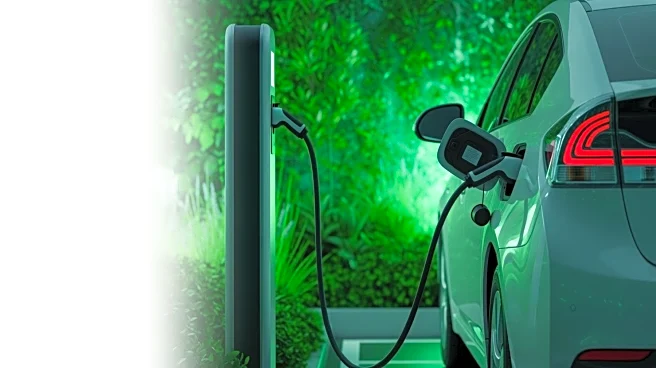What's Happening?
Recent data from the European Environment Agency (EEA) indicates that plug-in hybrid vehicles (PHEVs) emit only 19% less CO2 per kilometer than traditional petrol and diesel cars. This revelation challenges
the EU car industry's push to classify PHEVs as carbon-neutral under a 'technology neutral' approach to vehicle decarbonization. The analysis, conducted by Transport & Environment (T&E), examined emissions data from 127,000 PHEVs and found that these vehicles emit far more CO2 than official tests suggest. Even in electric mode, PHEVs consume fuel and emit 68g of CO2/km, which is significantly higher than the figures reported in official tests. The hidden fuel consumption results in an additional cost of €500 per year for the average PHEV driver.
Why It's Important?
The findings have significant implications for the automotive industry and environmental policy. If PHEVs are not as environmentally friendly as previously thought, this could impact the EU's strategy for reducing vehicle emissions and achieving climate goals. The data suggests that PHEVs may not be the sustainable solution they were once considered, potentially leading to increased scrutiny and regulatory changes. This could affect car manufacturers' plans and investments, as they may need to shift focus towards more genuinely zero-emission vehicles like battery electric cars. Consumers may also reconsider purchasing PHEVs due to their higher operational costs and environmental impact.
What's Next?
The EU car industry is lobbying to continue selling PHEVs beyond the 2035 deadline for zero-emission cars, arguing for the removal of 'utility factors' that correct CO2 ratings. These factors are set to tighten emissions targets, pushing manufacturers towards battery electric vehicles. If the industry succeeds, it could delay the transition to cleaner technologies, impacting the EU's climate objectives. Stakeholders, including environmental groups and policymakers, are likely to engage in debates over the future of PHEVs and the best path forward for sustainable transportation.
Beyond the Headlines
The controversy surrounding PHEVs highlights broader issues in the automotive sector, such as the accuracy of emissions testing and the effectiveness of current regulations. It raises ethical questions about the transparency of car manufacturers and the potential for misleading consumers. Long-term, this could lead to stricter testing protocols and a reevaluation of what constitutes a 'clean' vehicle, influencing both market dynamics and consumer trust.










